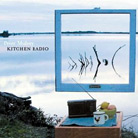July 2004
 The thoughtfully and delicately arranged opening track of veteran recording
artist Peter Mulvey’s Kitchen Radio begins with one quiet ethereal note. The
note may be played on a synthesizer -- the liner notes don’t say -- but it’s
soon joined by a finger-picked guitar on a minor chord that dominates the song, giving way
briefly to one or the other of two major chords. Only the bridge goes beyond those three
chords. The song, "Road to Mallow," sounds so much like a traditional ballad in
its simplicity, its chord progression, its topic, and its opening lyrics that I was
surprised at hearing modern language, such as "vapor trails" and
"Euros," later in the song. Mulvey wrote it, and he wrote or co-wrote all of the
rest except for one instrumental track. "Road to Mallow" opens with these lines: The thoughtfully and delicately arranged opening track of veteran recording
artist Peter Mulvey’s Kitchen Radio begins with one quiet ethereal note. The
note may be played on a synthesizer -- the liner notes don’t say -- but it’s
soon joined by a finger-picked guitar on a minor chord that dominates the song, giving way
briefly to one or the other of two major chords. Only the bridge goes beyond those three
chords. The song, "Road to Mallow," sounds so much like a traditional ballad in
its simplicity, its chord progression, its topic, and its opening lyrics that I was
surprised at hearing modern language, such as "vapor trails" and
"Euros," later in the song. Mulvey wrote it, and he wrote or co-wrote all of the
rest except for one instrumental track. "Road to Mallow" opens with these lines:
The next two songs on the disc are musically very different from "Road to Mallow" and from each other. "Shirt" is a quick, more modern-sounding acoustic tune about the passage of time and its many experiences, which are unified by the presence of the "same old corduroy shirt." "29-Cent Head," is the closest thing on Kitchen Radio to social protest, with a dissonant, rough-edged rock sound. One thinks, "What kind of musician is this guy?" Well, many good singer-songwriters and performers do not fit narrowly defined categories. For purposes of this collection, think of Mulvey as a singer-songwriter comfortable with a wide range of styles. Otherwise you’ll be confused. For if you get through track seven, track eight, track nine and tell yourself you haven’t heard any rock’n’roll, track 12 will surprise you. "Toad," it’s called:
The tune starts with a peppy acoustic-guitar riff, quiet like some jazz, but soon the drums (Mike Piehl, who does a fine job with the sticks on many tracks) have it hopping. As the song develops, the electric guitar increasingly runs the show, played skillfully by Mulvey’s main songwriting partner, David Goodrich, who also produced the disc. Let’s back up, though. The most beautifully written and most moving song draws little attention to itself, being one of the quietest and least orchestrated. "Rise" captures a perfect moment that often makes life afterwards seem empty by comparison. It begins:
Each of the other three verses just contains four lines. Packing so many words into the first captures the concretely detailed nature of the experience and the memory; the less belabored later verses suggest the rapid passing of time and its inability to supplant the memory. The concluding verse:
The weight of "rise" at the end of the first verse, twice at the end, and its solo appearance atop the song suggest a similarity between the memory, which the second verse says is "fixed now in my sight," and a loss akin to death that occurred with the original experience: "And it was then I saw the light / And felt the air go rushing past"; "I’ve wondered if I were a ghost." Much, much more could be said about this rare gem of a song. Its succinctness, the alternating rhyme, the repetition of specific visual images, including "your eyes" (referring to the singer’s perception of the other person’s joy in the remembered moment, not merely his own) -- all these elements contribute to the power of this fine song by Mulvey and Goodrich. It is the kind of song that makes a serious listener wish serious songs had a chance to stand out amidst the mass of mediocre material much more aggressively marketed in the vast media world. The kind of song that stops you in your tracks, opens your heart, and slows you down the way the "you" in the song tugs at the singer’s sleeve, reminding you of the potential of art quietly to let you in on life’s key secrets. Some of the other songs on Kitchen Radio also seize and build on particular moments -- all that is happening in people’s lives in "Denver, 6 a.m."; what it is like with everyone else gone, spending an evening with "Me & Albert." But the others don’t seem to say as much as "Rise," no matter how clever or true. Have a listen for yourself -- much is of interest here. GO BACK TO: |
 Peter Mulvey - Kitchen
Radio
Peter Mulvey - Kitchen
Radio